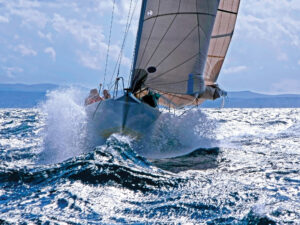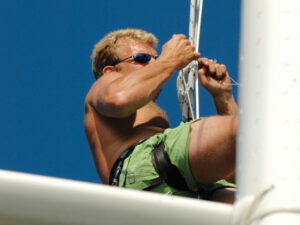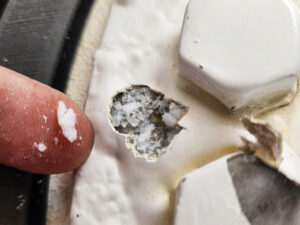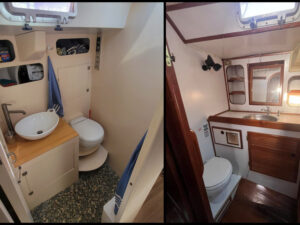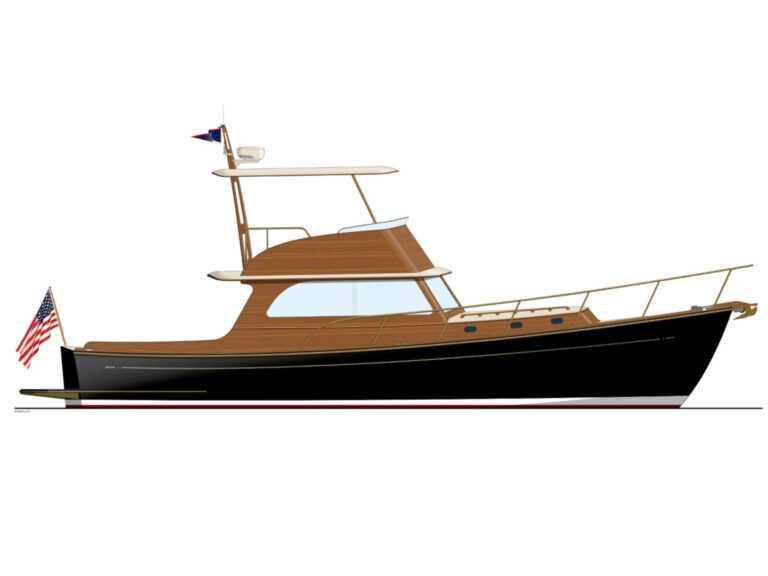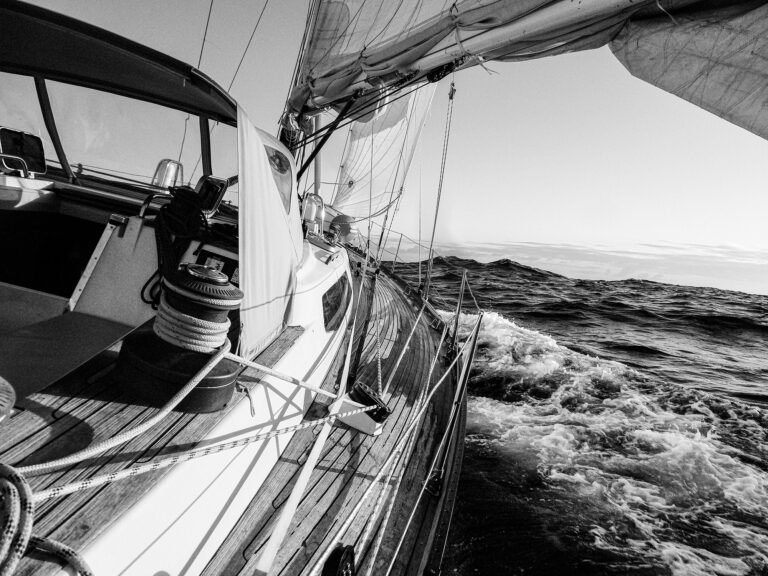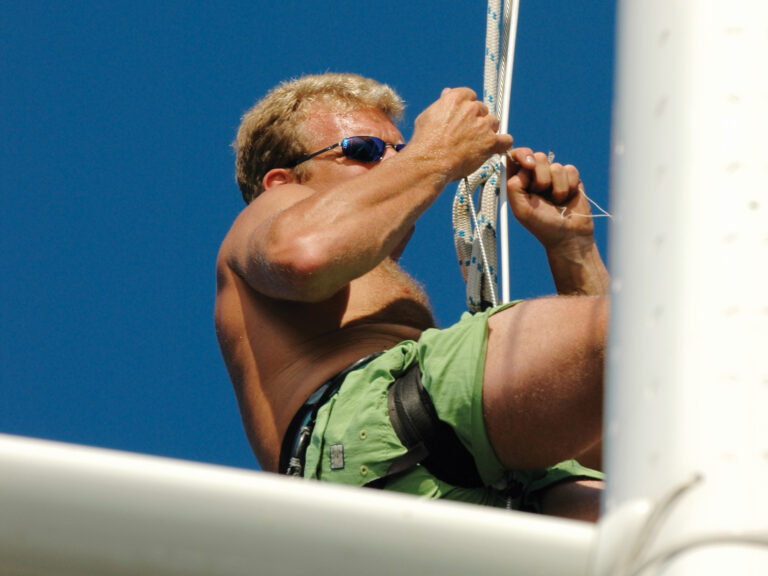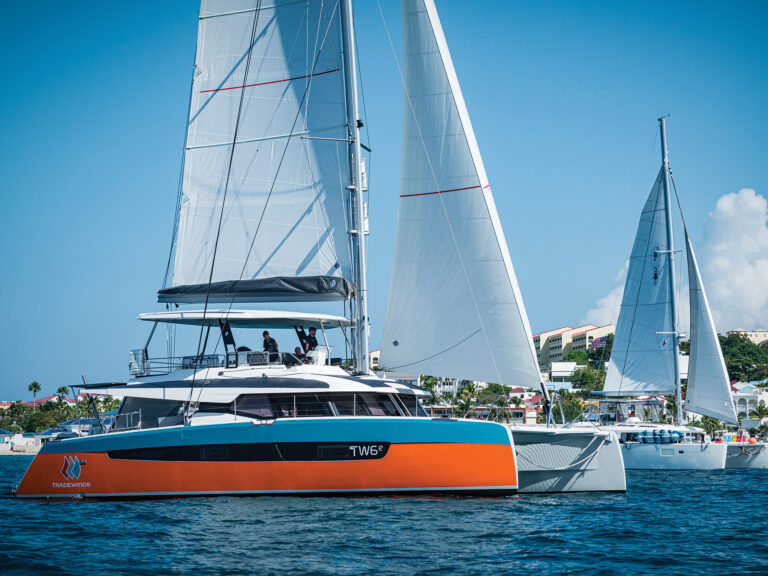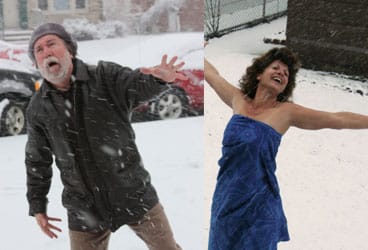
Cold Fatty
For the last 30 years of ocean cruising, we’ve headquartered out of the tropics. The reason for this is simple: We suffered greatly while living aboard in Boston for three winters as we put the finishing touches on our self-built, 36-foot ketch, Carlotta. During that time, we endured not only living in our messy workplace but also the scourge of empty pockets. Poverty, salt water, sawdust, and thin clothes are never a good combination. Luckily, we were young. So when we finally managed to make our escape to the blissful Caribbean, we vowed, “Never again!”
We’ve kept that promise, up until now. This winter, we’ll live aboard in Finike, Turkey, which is located at 36 degrees north. Why? Our first grandchild. We’re aquiver with the possibilities of sharing, teaching, and learning. But to be honest, I’m a tad leery of cold-weather living on a boat without insulation.
We’re used to seeing palm trees out of the portholes, not snow-capped mountains. Will I enjoy snow skiing as much as waterskiing? Snowboarding versus surfboarding? Only time will tell. Yes, we’ll report back in the spring—if we haven’t expired from hypothermia.
One thing I do know for certain: With my wife, Carolyn, at my side, I can do almost anything.
The particular winter morning I keep thinking about with apprehension happened in the middle of the 1970s. That summer, we’d moved aboard our partially completed hull, and we were now waking up on the coldest day of the coldest year in four decades, according to The Boston Globe. We’d been frozen in 18 inches of ice for over a month by this point. The outside temperature had been below freezing for 48 days and far below zero for four. We had to remember to fill the kettle with water before we went to bed (when our Shipmate stove was glowing cherry red) because in the morning our water tanks would be frozen, so our galley-sink pump wouldn’t work.
At 0630 our alarm clock sounded, and I was forced to snake a hand momentarily out of our sleeping bag to silence it. “Time to rise and shine,” I whispered to Carolyn as I nibbled a delicious shoulder.
Carolyn has many sterling attributes, but being a morning person isn’t one of them. “No way!” she grunted and started to turn over in mock refusal. Only she couldn’t turn over. At first, this lack of mobility puzzled her. “Fatty,” she started to ask, then sighed in frustration. “Damn it!”
Her dark Italian hair was long, per the peace-and-love style of the day. Unfortunately, a large part of her lovely mane had somehow contacted the damp hull during the night. She was follicly frozen to the boat.
“Help!” she said plaintively. At first I attempted to gently yank her dark strands away without applying any pressure to her scalp. This was neither easy nor successful. We discussed cutting her hair with scissors, but both of us quickly came to the conclusion that her crown of glory would be misshapen for months if we did so.
“We’ll have to unfreeze it,” she said, a bit panicky.
I smiled, fluttered my eyebrows seductively, and said, “The slowest method might be the best.”
She rolled her eyes and wearily, though gingerly, shook her head. “Not now, Fatty. And besides, we’ll be late for work. Heat up some water, Sir Galahad. And fire up the Shipmate while you’re at it. This damsel is officially in distress.”
Now, you’d think that unfreezing your wife with boiling water would be easy as pie. It’s not. The whole side of the hull was frozen, and the water stopped boiling within nanoseconds of contact. Except for a few teaspoons that I splashed on her directly. That water was still scalding hot.
“Stop! Stop!” she screamed. “Being frozen to the side of our new home is bad enough. I don’t need to be scalded to death to see the irony!”
“Touchy this morning, are we?”
There was a moment of silence, then a horrible crack! as our whole world fell a couple of long, painful inches. It did this, for six-hour periods, with great regularity. We tried all winter to get used to it, but we never managed the feat. It was unnerving.
What had just happened was this: We were tied to a floating dock at the Crystal Cove Marina in Winthrop, Massachusetts, which is located just nor’east of Boston. Everything was frozen in thick ice that was under great pressure. Alas, there are nine-foot tides in this area. As a result, our vessel, our dock, and every single thing in the harbor would periodically get temporarily hung up as the tide dropped. Soon, hundreds of thousands of tons of ice would be suspended in the air, first by the barest amount, but eventually by a quarter of an inch or more. To relieve the spiking pressure of all those tons, something had to give. Thus, the ice cracked. Everything fell. It sounded like a muffled cannon shot.
Each time it happened, I’d consciously check myself to make sure I hadn’t peed or vomited. Then I’d look as unconcerned and carefree as I could manage to reassure Carolyn.
Carolyn wasn’t reassured, though, especially since the wooden Trumpy poweryacht just ahead of us had been crushed by the ice and was now severely listing to port. Even our floating dock (made with twin 10- by 12-inch Douglas fir beams) had been cleaved into two pieces by a relatively minor split in the floes.
I was confident my vessel was strong enough, but I also realized that I now had no choice but to “keep the faith,” as we used to say in those heady times. It was impossible to leave the harbor. I’d watched one frantic lobsterman attempt to cut his vessel a way out with a chainsaw; a truly bizarre, Herculean project that ended in total failure. I’d picked Crystal Cove Marina because it almost never froze, and now we were living the almost part. For the record, I’d considered buying a bubbler system but had been assured there was no need. “Don’t be paranoid,” was how one harbor resident put it.
The falling tide was the most dramatic and toughest trial to deal with mentally. But the rising tide was a trickster, too, only its prank was a silent one. There were hundreds of solitary pilings holding all the floating docks in place. At dead low water, the tide would slow long enough in these extremely frigid temps to freeze-grip the heavy wooden poles, then gently lift them skyward as it began to rise. But once the tide began to fall, the poles would now be in slightly different places, so they couldn’t just magically drop back into their precise hole. So the pilings started to tower up and fall over in exaggerated slow motion, the truest expression of the phrase “freeze frame” that I’d ever seen.
At eight critical locations, there were three pilings jointed together at the tip in a tripod shape. At first, I’d thought these might hold. I was wrong. They started timbering down in an awkward, ultraslow manner, too.
The marina was self-destructing before our very eyes. Our boat was brand-new. Every penny we had was in it. We didn’t have insurance. What would happen when the ice broke up? Would everything be swept away? Ground to pieces? Cut to ribbons?
Yeah, you could call it stressful.
I was lost in these reveries when Carolyn dragged me back to reality by waving. “Hey, remember me?” she said. “The girl you keep fresh frozen?”
I redoubled my hot-water efforts to free her frozen mane. By the time we had her unglued from the ice, the only few spots on her skin that weren’t wet and frostbitten were scalded.
She didn’t look happy.
“No time for breakfast,” she snapped as she butt wiggled into her faded jeans. “Let’s go, go, go,” she said hastily. “It’s not fair to my co-workers if I’m late.”
The only problem was that we couldn’t go. The idiot who built the companionway slide (that would be me) had carefully crafted it to keep out water by making its tolerances precise and small. Last night, when we had the Shipmate coal stove roaring, the snow on the cabin top had partially melted and then refrozen. Now our sliding hatch wouldn’t.
“We’re stuck,” I said. “The hatch won’t open. Sorry.”
Carolyn glared at me. “OK, Fatty,” she said. “That’s cool. I dig it. I can’t get out of bed, because I’m frozen to it. I can’t shower because I’d instantly die and become a Popsicle. There’s coal dust on my skin, and everyone keeps asking me if I smell fire. I can’t even have a cup of tea because we’ve used all the water in the kettle unthawing my hair, except for the bit we used to scald me. And now we can’t leave our floating igloo because our well-intentioned-but-admittedly-dumb igloo builder didn’t factor in some basic igloo-construction data. Am I getting it about right?”
“I see no reason to accentuate the negative,” I said without conviction. “But yeah, you’re factually spot on.”
“The technical name for this is ‘pleasure boating,’ isn’t it?” she asked. “What sort of a sicko named it that? The same guy who made up ‘life insurance’? The same dude who came up with the good old oxymoron ‘military intelligence’?”
There are times to say nothing. This was one. She glared. I grinned and attempted to warm my damp hands by blowing on them.
“Perhaps we can escape through the forward hatch,” I said, logically. “If I can jiggle the sheets of plywood on deck off and cut the lines holding the tarp.”
This we managed to do, but it was a multistep process and took us quite a while. Worse, I severely damaged our wooden hatch and its mahogany carlin in the process.
We both noticed. Neither of us stated what was obvious, that the whole idea behind living aboard in the winter was to save money to improve the boat, not destroy it while so doing.
Were we getting ahead or falling behind financially? Mentally? Marriage-wise? Just the hatch would take days and dollars to repair. There was a thin line between clever economy and complete idiocy. I’d evidently lost sight of it.
I must have looked sad. Carolyn’s eyes squinted as she looked at me.
“Come on,” I said as I sprinted up the steep ramp onto the high wharf. “I’m parked close to the alley, and you know how great our car heater works!”
I’d paid the manager of Marine Hardware and Supply, Ross Cavalrie, $24 for a 1965 Chevy station wagon, and it had a heater that could, as we’d say back then, melt Nixon’s heart.
But when we got to it, there was a slight problem with the car.
It was exactly where I’d parked it, and it was completely undamaged. I’m sure it would’ve cranked up the moment I turned the key. But it was, alas, completely buried under a mountain of plowed snow. Winthrop had declared an official snow emergency, and this allowed the plow drivers to act in the best interests of the majority by knowingly plowing in cars.
It would take a week to shovel our vehicle out of the sudden, unexpected glacier that enveloped it.
“&#@!” I yelled and kicked the snow mountain with my boot. Until now, I’d been OK with our circumstances. But this was the last straw. How much could a man take? Why did I always make life so difficult for everyone? We were just trying to go to work to earn the money to finish the boat. “&#@!” I screamed again, fuming and frustrated.
Carolyn slid silently up beside me, put her arm in mine, and said brightly, “Come on, Fatty. It’s only six blocks to the bus stop. We can make it. Now, tell me about Tahiti.”
“Tahiti?” I said, confused, as she turned me, and we pushed on down the snowy road toward the distant transportation.
“Yeah,” she said. “Or Moorea. It doesn’t matter. Even South Florida will do!”
“Well, it’s warm in Tahiti,” I said, counting my lucky marital stars and grinning widely as we strolled. “And since there’s fish in the sea and fruit on the trees, you don’t have to have a shore job. Time isn’t much of a factor, either, since there’s no card to punch. Nobody’s in a rush. Polynesians are friendly. Tahitians, in particular, are very loving and very sensuous people, and they.…”
Cap’n Fatty Goodlander and Carolyn report that they’re once again sharing the same sleeping bag aboard their present boat, Wild Card_._

